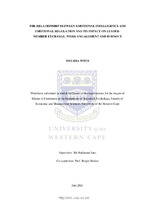| dc.contributor.advisor | Jano, Rukhsana | |
| dc.contributor.author | Titus, Melissa | |
| dc.date.accessioned | 2022-02-01T09:49:47Z | |
| dc.date.available | 2022-02-01T09:49:47Z | |
| dc.date.issued | 2021 | |
| dc.identifier.uri | http://hdl.handle.net/11394/8668 | |
| dc.description | Magister Commercii (Industrial Psychology) - MCom(IPS) | en_US |
| dc.description.abstract | Organisations spend copious time and resources recruiting and selecting the best candidates to fill a vacancy. In the modern-day work environment, high-performing and engaged employees are the key drivers of organisational success. Organisations spend considerable time and resources to ensure that employees with the proper skills are selected into the organisation. More recently, companies shifted their focus from technical skills to competencies that advance teamwork and collaboration. Agile organisational structures dependent on a flexible and collaborative workforce to adapt to changing market conditions. This study focused on the role of emotional intelligence, mediated through emotional regulation on leader-member exchange (LMX). | en_US |
| dc.language.iso | en | en_US |
| dc.publisher | University of Western Cape | en_US |
| dc.subject | Emotional intelligence | en_US |
| dc.subject | High-quality relationships | en_US |
| dc.subject | Low-quality relationships | en_US |
| dc.subject | Work engagement | en_US |
| dc.subject | Burnout | en_US |
| dc.title | The relationship between emotional intelligence and emotional regulation and its impact on leader-member exchange, work engagement and burnout | en_US |
| dc.rights.holder | University of Western Cape | en_US |

